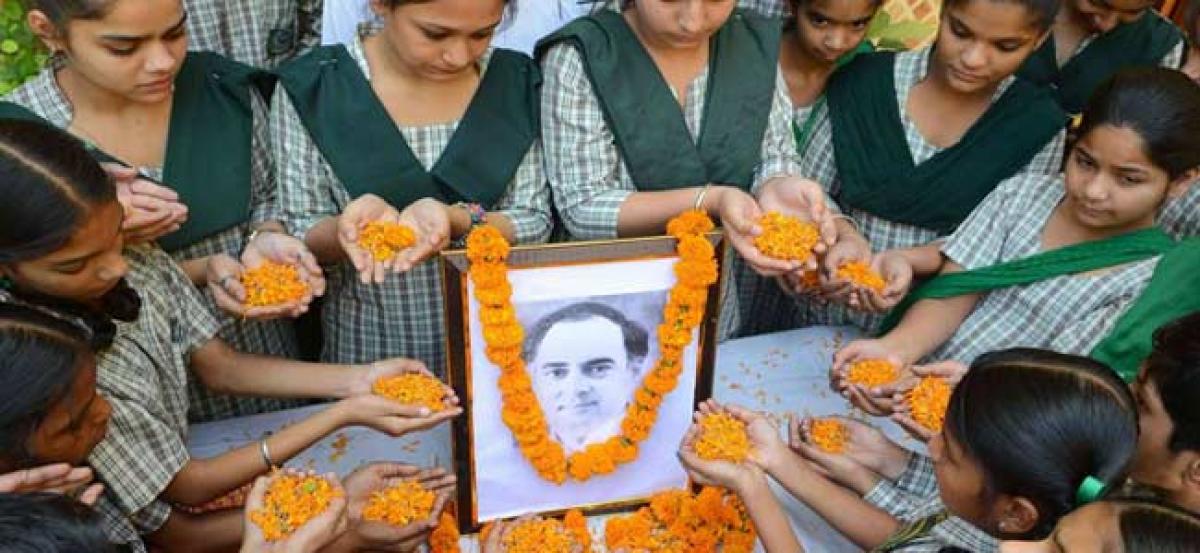Live
- Include Valmiki community in ST list, MP Ambica pleads
- Chandrababu Advocates Strict Measures for Social Welfare and Infrastructure Development in AP
- Show of brotherhood by Vijayan, Stalin at event to honour Dravidian icon
- District Collectors’ conference with CM begins
- Celebrations kick off in Saudi Arabia to welcome FIFA World Cup 2034
- Google Unveils Jules AI to Help Developers Fix Code Errors
- Bengaluru Techie’s Tragic Suicide Sparks Outrage Over Family Disputes and Legal Failures
- Crucial Union Cabinet meeting to discuss One Nation One Election
- Irrigation AE Nikhesh Kumar Arrested in Disproportionate Assets Case, Granted 4-Day Custody
- Your Daily Horoscope for December 12, 2024: Unlocking Mysteries of the Stars
Just In

As the nation today paid tributes to Rajiv Gandhi on his death anniversary, the investigation in the assassination of the former Prime Minister is still on, 27 years after his ghastly killing.
As the nation today paid tributes to Rajiv Gandhi on his death anniversary, the investigation in the assassination of the former Prime Minister is still on, 27 years after his ghastly killing.
The status of ongoing investigation by the CBI-led Multi Disciplinary Monitoring Agency (MDMA), probing the larger conspiracy aspect behind the assassination, was shared with the Supreme Court which had in March asked the Centre to place before it the steps which were required to be taken to brought it to an end as "expeditiously as possible".
The MDMA had informed a bench headed by Justice Ranjan Gogoi that the probe into the case was "still open" and Letters Rogatory have been issued to different countries, including Sri Lanka, where some persons required to be investigated were currently residing.
Rajiv Gandhi was assassinated on the night of May 21, 1991 at Sriperumbudur in Tamil Nadu by a woman suicide bomber, identified as Dhanu, at a poll rally. Fourteen others, including Dhanu herself, were also killed in the explosion.
Gandhi's assassination was perhaps the first case of suicide bombing globally, which had claimed the life of a high-profile leader.
The MDMA, set up in 1998 on the recommendations of Justice M C Jain Commission of Inquiry which had probed the conspiracy aspect of Gandhi's assassination, is headed by a CBI official and comprises officers from IB, RAW and Revenue Intelligence and other agencies.
"The Union of India is directed to place before the court the steps that have been taken and those that can be initiated, through the diplomatic channels, to ensure that investigation with regard to the issue of larger conspiracy is brought to an end as expeditiously as possible," the apex court had said on March 14.
The top court had asked the MDMA to file a status report within four weeks with regard to the status of a Letter Rogatory sent to Sri Lanka for examining one of the suspects, Nixon alias Suren, who is lodged in Colombo jail.
Nixon was reportedly a member of LTTE's intelligence wing, who manned a wireless base in Tamil Nadu and had allegedly recruited some of the accused at Jaffna.
In its May 1999 order, the top court had upheld the death sentence of four convicts -- A G Perarivalan, Murugan, Santham and Nalini -- in the assassination case.
In April 2000, the Tamil Nadu governor had commuted the death sentence of Nalini on the basis of the state government's recommendation and an appeal by former Congress president and Rajiv Gandhi's widow Sonia Gandhi.
On February 18, 2014, the top court had commuted the death sentence of Perarivalan to life imprisonment, along with that of two other prisoners - Santhan and Murugan - on grounds of a delay of 11 years in deciding their mercy pleas by the Centre.
The apex court had in March this year dismissed a plea by Perarivalan seeking recall of the May 1999 verdict upholding his conviction. The charge against Perarivalan was that he had purchased two nine volt battery cells meant for detonating the bomb.
Rajiv Gandhi became the youngest prime minister of India at 40, when he assumed office after his mother and former Prime Minister Indira Gandhi was assassinated in 1984.

© 2024 Hyderabad Media House Limited/The Hans India. All rights reserved. Powered by hocalwire.com







